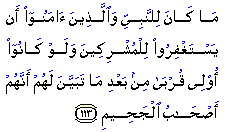Condemned to Fire, Merchant of Musk, Quran & Hadith Only, Learning in Vacuum
Issue 361 » January 13, 2006 - Zul-Hijja 12, 1426
General
| Living the Quran |
Al-Tawbah
(Repentance)
If a person prays to God for someone's pardon it implies, first of all, sympathy and concern for the offender, and a belief that the offence is pardonable. Such an attitude towards an offender who is otherwise faithful is quite all right. But to sympathize with, and love those who have indulged in open rebellion against God and to consider that rebellion pardonable is quite a different matter. Such an attitude is not only wrong in principle but leaves one's loyalty open to doubt. Were we to pray for someone's pardon merely on grounds of kinship, it would mean that we hold our tie of kinship to be more important than our loyalty to God. True faith requires that we should consider God's friends as our friends and God's enemies as our own enemies. It is significant that the verse in question does not say that Muslims should not seek pardon for those who ascribe divinity to others than God. The verse rather characterizes it as something unbecoming of the Prophet (peace be on him) and the believers. It may, however, be clarified that the kind of sympathy which is forbidden for those who have rebelled against God is sympathy which interferes with, and prevents one from fulfilling one's religious obligations. So far as human sympathy is concerned - consideration, compassion and affection - far from being forbidden, it is praiseworthy for a believer to possess such attributes. The worldly obligations that one owes to one's kinsmen - whether they are believers or unbelievers - must be fulfilled. Likewise, those in distress - the needy, the sick, the injured, the orphans - must be helped irrespective of their religious faith. In such matters any discrimination between a believer and an unbeliever is out of the question. Source: |
| Understanding the Prophet's Life |
| The Merchant of Musk The company one keeps has major effects. It may lead either to benefit and improvement or to harm and corruption, depending on whether the company is that of pure and eminent people or people who are corrupt and evil. This effect does not appear suddenly, but is a gradual process that unfolds with time. The Messenger of God, may blessings and peace be upon him, said, "A man will be with his companions." And, "A Man's religion is that of his intimates, so let each of you consider who he becomes intimate with." He also said:
If you wish to know whether those you mix and sit with increase or diminish your faith, religion, and actions compare your state with regard to good character, praiseworthy intentions, resolution in performing acts of obedience, and goodness before and after their companionship. If you find that these acts have become stronger and more firmly established and that you have become more desirous of and interested in them, then know that this particular company is of benefit to your religion and your heart, and that if you continue with it you will gain even greater benefits and acquire many more good things, God willing. Source: |
| Unlearn! |
In the attempt to extinguish a burning desire for ‘learning Islam or Deen’, many practicing Muslims, often take extreme approaches to the study of Islam that are devoid of practicality and spirituality. In order to overcome this problem we need to unlearn, before we learn. This section is covering some misconceptions that we need to unlearn before we move on to learning Islam. Stick to Quran and Hadith Only Some people think that their personal reading of Quran translation and a few Ahadith is enough to pass judgements on complex matters in our community. They discard the valuable collection of wisdom, reflections, and sciences developed by the classical scholars. Such simplistic, literal, and naïve thinking often results in perverted Fatwas that make media headlines. We need the aid of scholars and contemporary sciences to come to a comprehensive solution. Learning in a Vacuum Our Islamic education cannot be detached from the problems of our society: it should directly address the concerns of the people. “Our problem, in the Muslim community of North America, is not that we have a lack of Islamic knowledge. We have hundreds of Muslim scholars graduating from Islamic universities around the world and coming to the West every year. Yet there is no change! The real problem is that we have lost the real vision and understanding of the mission of Islam!” explains Imam Khalid Griggs, a North American Muslim leader, activist and scholar. Where are our priorities? Source: |
